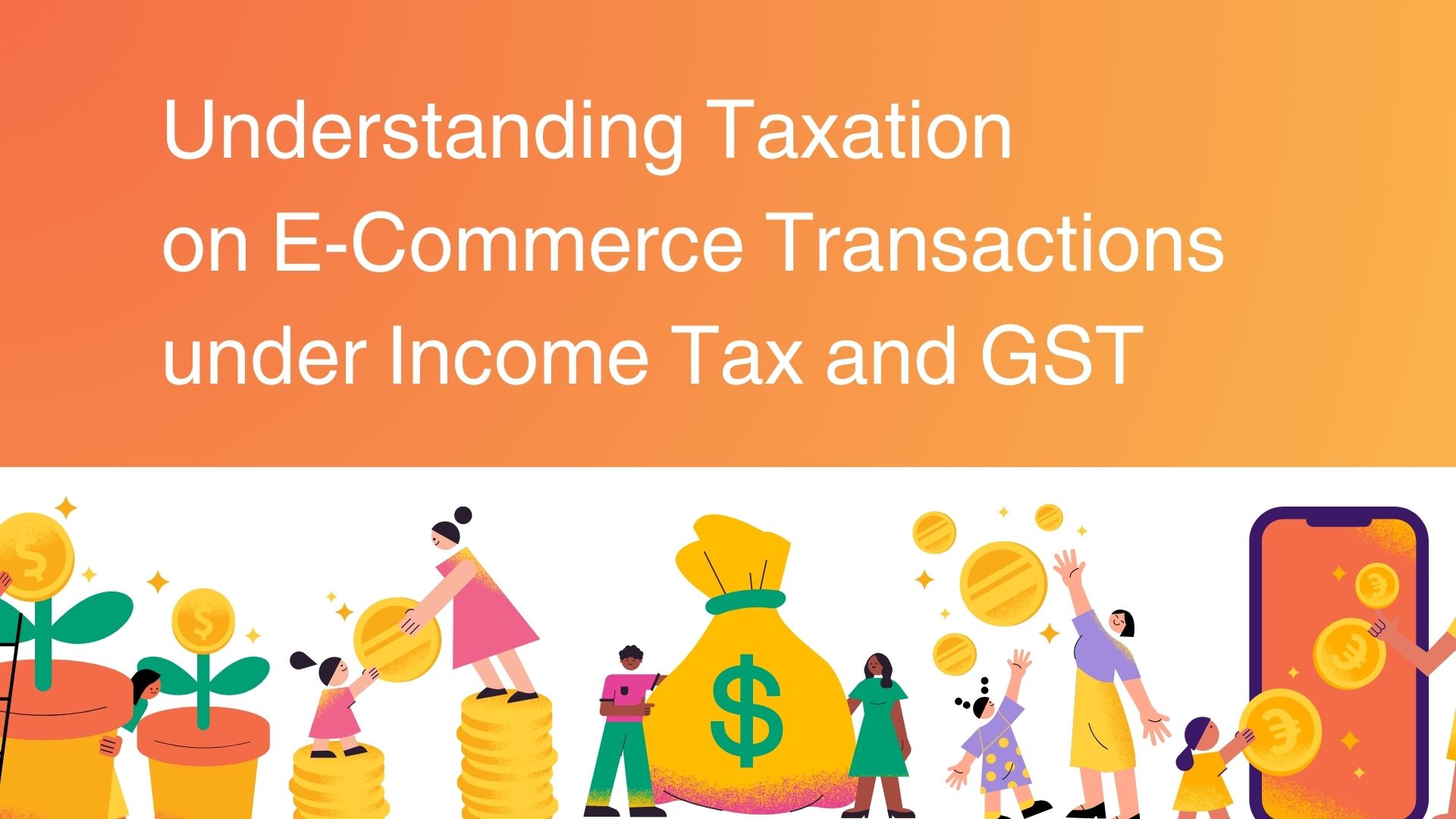Understanding Taxation on E-Commerce Transactions under Income Tax and GST (with Practical Examples)
E-Commerce transactions are affected by several tax rules under Income Tax and GST. The government has introduced new sections in both Direct and Indirect Taxes to prevent tax evasion and ensure proper tax collection.
In the past, when there were no specific rules for E-Commerce, small sellers using E-Commerce platforms could avoid paying taxes on their sales and services. Similarly, Non-Resident E-Commerce Operators made profits in India without paying taxes. To address this issue, the government introduced specific provisions under Income Tax and GST.
Under the Income Tax Act: (Taxation on E-commerce Transaction)
Section 194-O (introduced by the Finance Act, 2020) states that e-commerce operators must deduct TDS at 1% on the total sales or services amount. This deduction should be made either when the sale amount is credited to the e-commerce participant’s account or when payment is made to the participant, whichever happens first.
However, the term “gross amount of sales” is not clearly defined. Here’s an example to explain: If the total sales amount is ₹30 lakhs and returns are ₹5 lakhs, TDS should be deducted at 1% on ₹30 lakhs (the total sales) and not on ₹25 lakhs (sales after returns).
Explanation of Key Terms:
- E-commerce operator: This refers to a person who owns, runs, or manages a digital platform for online business (e-commerce). They can be either an Indian resident or a non-resident.
- E-commerce participant: This is a person in India who sells goods or provides services (including digital products) through an online platform. If the participant is a non-resident, TDS (Tax Deducted at Source) rules do not apply.
Important Points:
- According to Section 194O, if a buyer directly pays an e-commerce participant for goods or services sold through an e-commerce platform, it will still be considered as payment made by the e-commerce operator. This amount will be included in the total sales or services for TDS purposes.
- TDS Exemption: No TDS is required if the e-commerce participant (an individual or HUF) earns up to ₹5 lakhs in a financial year from sales or services. However, this exemption does not apply if the services are related to hosting advertisements.
- These rules apply even if the buyer of goods or services is a non-resident. However, they do not apply if the e-commerce participant uses their own website for business.
Section 165 – Equalization Levy (introduced by Finance Act, 2016):
This levy applies in the following cases:
- A resident person running a business or profession in India, or
- A non-resident with a permanent establishment in India,
when they make payments for online or digital advertising to a non-resident who does not have a permanent establishment in India.
- Threshold: Payment must exceed ₹1 lakh per year.
- Responsibility to deduct/pay the levy: The person making the payment for online/digital advertising.
- Rate: 6% of the payment amount for online advertising.
- Exclusion: Advertisements used for personal purposes.
Section 165A – Equalization Levy (introduced by Finance Act, 2020):
This levy applies when an e-commerce operator earns from providing e-commerce goods or services to:
- A resident in India,
- A non-resident under certain conditions, or
- Any person using an IP address located in India.
- Specified circumstances:
i. Sale of advertisements targeting Indian customers or accessed through an IP address in India.
ii. Sale of data collected from an Indian resident or someone using an IP address in India. - Threshold: The e-commerce operator’s annual sales/turnover from goods or services must exceed ₹2 crores.
- Responsibility to deduct/pay the levy: The e-commerce operator.
- Rate: 2% of the amount earned.
- Exclusions:
i. The e-commerce operator has a permanent establishment in India.
ii. Transactions covered under Section 165.
Under GST Act
Under Section 52 of the CGST Act, 2017, every e-commerce operator must collect a tax amount, as notified by the government, not exceeding 1% of the net value of taxable supplies made through their platform by other suppliers. The “net value of taxable supplies” means the total taxable supplies minus any returned supplies.
Key Points:
- Limit: No specific limit is mentioned.
- Liability: The e-commerce operator is responsible for collecting this tax.
- Rate:
- Intra-State Sales: 0.5% as CGST and 0.5% as SGST.
- Inter-State Sales: 1% as IGST.
Deadlines:
- Payment of TCS: Must be paid to the department within 10 days after the month in which TCS was collected.
- Monthly Statement: File within 10 days after the month in which TCS was collected.
- Annual Statement: File on or before 31st December of the following financial year.
Credit and Matching:
- The supplier can claim the TCS amount as credit in their electronic cash ledger.
- Outward supplies reported by suppliers in their returns will be matched with the outward supplies reported by the e-commerce operator.
Section 9(5) of the CGST Act, 2017:
- Passenger Transport Service (Cab or Motorcycle):
- The E-Commerce Operator (ECO) must pay 100% of the tax, whether the cab operator is registered or not.
- Accommodation Services (Hotels, Inns, etc.):
- If hotels or similar establishments are registered, they are responsible for paying the tax, not the ECO.
- If the hotels or establishments are not registered, the ECO is responsible for paying the tax.
- Housekeeping, Plumbing, Carpeting Services:
- If the service providers (e.g., plumbers, housekeepers) are registered, they pay the tax, and the ECO has no tax liability.
- If the service providers are not registered, the ECO is responsible for paying the tax.
Contradiction Between Income Tax and GST:
There is a conflict between the TDS provision under Section 194O of the Income Tax Act and Section 52 of the CGST Act. Both require the electronic commerce operator to handle tax—deduct TDS under the Income Tax Act and collect tax under the GST Act—for the same transaction. So, this blog is all about the Taxation on E-Commerce Transactions under Income Tax and GST.
Here’s a simplified version with clear meaning:
In this case, Alpha Ltd has total sales of 25 lakhs (Gross Sales), but after deducting sales returns and excluding GST, the actual sales come to 20 lakhs (Net Sales). As a result, Alpha Ltd will:
- Deduct TDS (Tax Deducted at Source) at 1% on 25 lakhs, which equals Rs. 25,000.
- Collect TCS (Tax Collected at Source) at 1% on 20 lakhs, which equals Rs. 20,000.
If Alpha Ltd charges a 5% commission, that’s Rs. 1,00,000 (5% of 20 lakhs). They will also add 18% GST on the commission, making the total commission Rs. 1,18,000.
Mr. Rajesh doesn’t need to deduct TDS on the commission paid to Alpha Ltd because Section 194O overrides the rules for TDS in this case.
The total payment Alpha Ltd will make to Mr. Rajesh is shown below:
Here’s a simpler version with clear meaning:
Mr. Rajesh can claim the TCS of Rs. 20,000 in his Electronic Cash Ledger, and he can either use it for future payments or request a refund. He can also claim the TDS of Rs. 25,000 when filing his Income Tax Return.
Example 2 – Mr. Rahul (Resident):
Mr. Rahul sells products in India through Beta Inc, a Non-Resident E-Commerce Operator. The total sales are Rs. 10 crores. According to Section 194O, an E-Commerce Operator, whether resident or non-resident, must deduct TDS at 1% of Rs. 10 crores, which is Rs. 10 lakhs. Additionally, Beta Inc must also pay a 2% Equalization Levy on Rs. 10 crores, as per Section 165A (introduced by the Finance Act, 2020).
Example 3 – Advertisement Services:
If, in Example 2, instead of selling products, the transaction was for advertisement services or digital marketing, both Section 194O and Section 165 would apply. Beta Inc would still deduct TDS at 1% under Section 194O, which amounts to Rs. 10 lakhs. On the other hand, Mr. Rahul would need to pay a 6% Equalization Levy on Rs. 10 crores under Section 165, as introduced by the Finance Act, 2016.
F
Need Help?
FAQs
1. What is e-commerce taxation under Income Tax and GST?
E-commerce taxation refers to the tax obligations of individuals or businesses conducting transactions online. It includes:
- Income Tax: Tax on the income earned through e-commerce platforms.
- GST (Goods and Services Tax): Tax on the supply of goods or services through online platforms.
2. Who is liable to pay tax on e-commerce transactions?
- Under Income Tax: Any individual, firm, or company earning income through e-commerce is liable to pay income tax.
- Under GST:
- Sellers: Must pay GST on the goods/services supplied through e-commerce platforms.
E-commerce Operators: Responsible for collecting and depositing GST under the TCS (Tax Collected at Source) provisions.
3. What is TCS under GST for e-commerce operators?
Tax Collected at Source (TCS) is a provision under GST where e-commerce operators collect 1% of the net taxable supplies made through their platform and deposit it with the government.
4. Do sellers on e-commerce platforms need GST registration?
Yes, sellers supplying goods or services through e-commerce platforms must register for GST, irrespective of their turnover. However, certain exemptions apply for small service providers under specific conditions.
5. How is income from e-commerce transactions taxed under Income Tax?
Income earned through e-commerce platforms is treated as business income and is subject to:
- Tax based on the applicable income tax slab rate for individuals or the corporate tax rate for companies.
- Filing of income tax returns (ITR) to report the earnings.
6. Are there any special tax provisions for e-commerce under Income Tax?
Yes, certain provisions include:
- Section 194-O: E-commerce operators must deduct 1% TDS (Tax Deducted at Source) on payments to sellers exceeding ₹5 lakhs annually.
Presumptive Taxation (Section 44AD): Small businesses with turnover up to ₹2 crore can opt for simplified taxation.
7. Are e-commerce businesses eligible for input tax credit (ITC) under GST?
Yes, businesses can claim ITC on GST paid on purchases or expenses directly related to their e-commerce transactions, subject to conditions.
8. What are the compliance requirements for e-commerce sellers under GST?
E-commerce sellers must:
- File monthly/quarterly GST returns (GSTR-1, GSTR-3B).
- Reconcile TCS credits collected by e-commerce operators.
- Maintain proper invoices and records for transactions.
9. How can an e-commerce business calculate its tax liability?
Tax liability can be calculated as follows:
- Income Tax: Total income from sales minus allowable deductions.
- GST: Output GST on sales minus Input Tax Credit (ITC) on purchases.
10. What are the penalties for non-compliance with e-commerce taxation rules?
Non-compliance can result in:
- Under Income Tax: Penalties for failure to report income or deduct TDS.
- Under GST: Penalties for non-registration, non-payment, or incorrect filing of returns.
11. How can I stay compliant with e-commerce tax rules?
- Maintain accurate records of sales, expenses, and tax deductions.
- Register for GST and file returns on time.
- Deduct and deposit TDS/TCS as required.
- Consult a tax professional for guidance.
Table of Contents
Toggle



